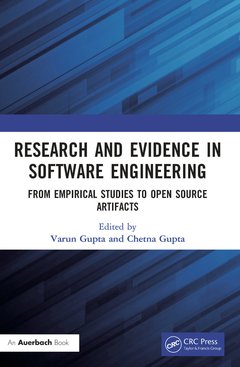Description
Research and Evidence in Software Engineering
From Empirical Studies to Open Source Artifacts
Coordinators: Gupta Varun, Gupta Chetna
Language: English
Subjects for Research and Evidence in Software Engineering:
Keywords
NLP; CSV File; Runtime Ratio; ACM Digital Library; POS Tag; IEEE XPLORE; CSV; Web APIs; Drupal Modules; PHP; Execution Tracing; Deep Learning Architectures; Bug Reports; Large Scale Software Development; Execution Time; Software Project Manager; Multi-agent Systems; PP; Sr; Multiple Linear Regressions; Deep Learning Models; Embedding Vectors; Theoretical Normal Distribution; Trace Output
Publication date: 09-2023
· 15.6x23.4 cm · Paperback
Publication date: 06-2021
· 15.6x23.4 cm · Hardback
Description
/li>Contents
/li>Biography
/li>
Research and Evidence in Software Engineering: From Empirical Studies to Open Source Artifacts introduces advanced software engineering to software engineers, scientists, postdoctoral researchers, academicians, software consultants, management executives, doctoral students, and advanced level postgraduate computer science students.
This book contains research articles addressing numerous software engineering research challenges associated with various software development-related activities, including programming, testing, measurements, human factors (social software engineering), specification, quality, program analysis, software project management, and more. It provides relevant theoretical frameworks, empirical research findings, and evaluated solutions addressing the research challenges associated with the above-mentioned software engineering activities.
To foster collaboration among the software engineering research community, this book also reports datasets acquired systematically through scientific methods and related to various software engineering aspects that are valuable to the research community. These datasets will allow other researchers to use them in their research, thus improving the quality of overall research. The knowledge disseminated by the research studies contained in the book will hopefully motivate other researchers to further innovation in the way software development happens in real practice.
Preface. Editor Biographies. Contributor Biographies. 1 Performance of Execution Tracing with Aspect-Oriented and Conventional Approaches. 2 A Survey on Software Test Specification Qualities for Legacy Software Systems. 3 Whom Should I Talk To?: And How That Can Affect My Work. 4 Software Project Management: Facts versus Beliefs and Practice. 5 Inter-Parameter Dependencies in Real-World Web APIs: The IDEA Dataset. 6 Evaluating Testing Techniques in Highly-Configurable Systems: The Drupal Dataset. 7 A Family of Experiments to Evaluate the Effects of Mindfulness on Software Engineering Students: The MetaMind Dataset. 8 Process Performance Indicators for IT Service Management: The PPI Dataset. 9 Prioritization in Automotive Software Testing: Systematic Literature Review and Directions for Future Research. 10 Deep Embedding of Open Source Software Bug Repositories for Severity Prediction. 11 Predict Who: An Intelligent Game Using NLP and Knowledge Graph Model. 12 Mining Requirements and Design Documents in Software Repositories Using Natural Language Processing and Machine Learning Approaches. 13 Empirical Studies on Using Pair Programming as a Pedagogical Tool in Higher Education Courses: A Systematic Literature Review. 14 Programming Multi-Agent Coordination Using NorJADE Framework. Index.
Dr. Varun Gupta received a Ph.D. degree and Master of Technology in Computer Science and Engineering degree from Uttarakhand Technical University, India. Currently, he is a postdoctoral researcher at University of Beira Interior, Portugal.
Dr. Chetna Gupta is an Associate Professor in the Computer Science Engineering Department of Jaypee Institute of Information Technology. Noida, India. She has more than 15 years of academic experience and her research areas include software engineering, distributed software engineering, search based software engineering, risk management, and cloud computing.
These books may interest you

Software Engineering for Science 117.69 €

Software Engineering for Science 56.31 €


